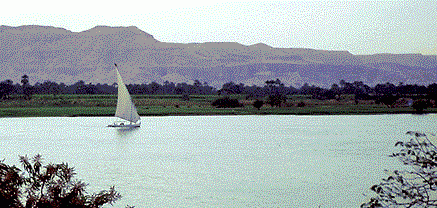 "I arrived ... at the city of Cairo, mother of cities ... mistress of broad provinces and fruitful lands, boundless in multitude of buildings, peerless in beauty and splendor, the meeting-place of comer and goer, the stopping-place of feeble and strong. ...She [Cairo] surges as the waves of the sea with her throngs of folk and can scarce contain them..." [Gibb, vol. I, p. 41].
"I arrived ... at the city of Cairo, mother of cities ... mistress of broad provinces and fruitful lands, boundless in multitude of buildings, peerless in beauty and splendor, the meeting-place of comer and goer, the stopping-place of feeble and strong. ...She [Cairo] surges as the waves of the sea with her throngs of folk and can scarce contain them..." [Gibb, vol. I, p. 41].
Cairo, Egypt
Life inside the walled city was crowded and frantic. The narrow streets were filled with people, camels, and donkeys and lined with thousands of shops and markets. Armies of peddlers and vendors also jammed the streets.
Ibn Battuta goes on to describe the city's many mosques, colleges, hospitals, and convents which housed the poor. They were built by the amirs (military commanders) who competed "with one another in charitable works and the founding of mosques and religious houses." [Gibb, vol. I, p. 54] Visit the Gallery to see some of the buildings he saw.
Ibn Battuta was particularly impressed with a maristan, or hospital, for its beauty and for its service to the sick. Such hospitals demonstrated Islamic commitment to "charity", one of the Five Pillars of Islam. A later traveler echoed this enthusiasm:
"Cubicles for patients were ranged round two courts, and at the sides of another quadrangle were wards, lecture rooms, library, baths, dispensary, and every necessary appliance of those days of surgical science. There was even music to cheer the sufferers; while reader of the Koran afforded the consolations of the faith. Rich and poor were treated alike, without fees, and sixty orphans were supported and educated in the neighboring school." [Lane-Poole, Story of Cairo, quoted in Dunn, p. 50.]
Nile Trip
Ibn Battuta stayed in Cairo about one month, but he decided to proceed to Mecca on his own by way of Upper Egypt to the Red Sea port of 'Aydhad and from there by ship to Jidda on the Arabian coast. This was generally a safe route under the protection of the Sultan, but it took longer and was less traveled than the route across the Sinai. Ibn Battuta was probably interested in being a tourist again and chose this route.
His trip up the Nile took him almost three weeks. He traveled by land rather than on the river, and along the way he lodged at the homes of scholars, qadis (judges), and Sufis or in college dormitories.
He observed the Nile which usually floods in June and described its importance to the economy and taxation of Egypt.

"If the rise amounts to 16 cubits*, the land-tax is payable in full. ... If it reaches 18 cubits it does damage to their farmland and causes an outbreak of the plague. If the Nile rises 15 cubits, the land-tax will be diminished. If it rises only 14 cubits or less, there will be prayers for rain and there is great misery." [abridged from Gibb, p. 51.]
* a cubit is an ancient measure from the finger to the elbow of an average person or about 18 - 20 inches.

 Take a side trip here to find out more about the Mamluks - "slave" rulers of Egypt.
Take a side trip here to find out more about the Mamluks - "slave" rulers of Egypt.